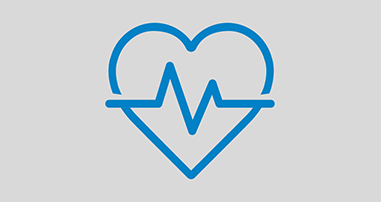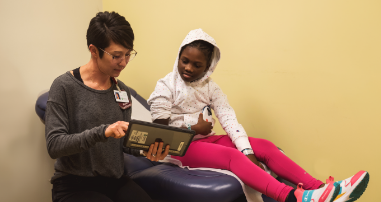An arrhythmia, also know as a heart rhythm disorder, is an abnormality in the electrical system of the heart that causes it to beat too fast, too slow or in an irregular way. Arrhythmias may be congenital, meaning they are present at birth, or they may develop during childhood, and can vary in severity, from mild and undetected to life-threatening. If your infant, child or teen has been diagnosed with an arrhythmia or is experiencing heart palpitations or chest pains, it is critical that they receive care from a pediatric heart specialist.
What does the Arrhythmia Program treat?
The Arrhythmia Program at the Children’s Heart Center provides dedicated outpatient and inpatient services for patients with a variety of heart conditions, including:
- Bradycardia: A slower than normal heart rate.
- Brugada syndrome: a genetic disorder that causes VT, or the lower part of the heart to beat faster.
- Catecholaminergic polymorphic ventricular tachycardia: also known as CPVT, this is a rare genetic heart condition in which stress or exercise triggers a fast and irregular heartbeat from the ventricles.
- Complete heart block: A condition in which the electrical signal from the upper to lower chambers is blocked. A complete heart block usually causes the heart to beat considerably more slowly and can cause the child to faint. This condition may develop after heart surgery or can be caused by heart disease.
- Fetal arrhythmia: An abnormal heart rhythm that occurs in a fetus before it is born.
- Hypertrophic cardiomyopathy: A common genetic disease in which abnormal genes in a child’s heart muscle causes the walls to become thicker than normal and impede blood from leaving the heart.
- Long QT syndrome: An inherited condition that causes the heart’s electrical system to take longer to recharge between beats.
- Sick sinus syndrome: A condition in which the sinus node, or the heart’s natural pacemaker, does not work as it should. It can cause a fast heartbeat, slow heartbeat or cause the heart to alternate between both.
- Sinus tachycardia: A fast heart rate that occurs because of fever, excitement or exercise.
- Supraventricular tachycardia: Also known as SVT, this is a faster than normal heart rate that is caused by abnormal electrical activity in the upper part of the heart or with an extra electrical pathway connecting the bottom and top of the heart. The most common tachycardia in children, SVT is typically not life threatening.
- Syncope: Fainting or passing out.
- Ventricular Tachycardia: Also known as VT, this is a serious arrhythmia that causes the lower part of the heart to beat faster.
- Wolff-Parkinson-White syndrome: Typically present at birth, is a rare condition in which a child has an extra electrical pathway that causes the heart to beat faster with some unique characteristics that allow the pathway to show up on an electrocardiogram.
About the Children’s Arrhythmia Program
The Arrhythmia Program at the Children’s Healthcare of Atlanta Heart Center specializes in the diagnosis, treatment and management of arrhythmias, from before birth to adulthood. One of the largest programs of its kind in the country, the Arrhythmia Program at the Children’s Heart Center treats all arrhythmias and heart rhythm disorders, from simple to complex. Our team of experienced cardiac electrophysiologists, pediatric cardiologists, advanced practice providers and genetic counselors work together to understand the cause of the arrhythmia while delivering coordinated care to help children live healthy lives.
Why Choose the Children’s Arrhythmia Program?
Family-centered care
We offer a variety of educational resources to inform and partner with you in your child’s heart care.
Expertise in arrhythmias
The Arrhythmia Program at Children’s is internationally recognized and cares for patients from before birth to age 22. You can be confident that your child is being cared for by an experienced team of cardiac electrophysiologists and pediatric heart specialists.
Comprehensive heart services
At Children’s, you have access to specialty heart care as well as a variety of support services to meet your family’s social and emotional needs. Our team will guide you through every stage of treatment, coordinating care to streamline your experience.
Innovation and Research
Our Arrhythmia Program is involved in and has led a number of research efforts that help move the care of our cardiac patients.

Signs of Heart Problems in Children and Teens
Heart disease can affect kids and teens. Learn which signs may indicate a heart problem.
Read MoreChildren may be referred to the Arrhythmia Program if they are experiencing symptoms such as chest pains, or if their heart feels like it is fluttering or pounding. We offer a variety of services to diagnose arrhythmias, including:
For patients with a family history of arrhythmia, Children's Healthcare of Atlanta offers a variety of services to determine whether your child has or is at risk for a genetic disorder that may cause an arrhythmia. Learn more about our genetics program.
Also known as an EKG or an ECG, an electrocardiogram is a test that records the electrical signals in a heart to monitor the heart’s overall health and to identify heart problems.
Cardiopulmonary Stress Test
A cardiac exercise stress test with metabolic gas analysis examines how the heart and lungs work together during and after exercise. Every few minutes, the exercise increases in difficulty, varying in speed and elevation on a treadmill and in resistance on a bike until the patient reaches a maximal effort. A patient is hooked up to an electrocardiogram to monitor heart rate and rhythm throughout the exercise. Additionally, a mask covers the nose and mouth and is used to monitor breathing and how the body uses oxygen and removes carbon dioxide during exercise.
Exercise Stress Echocardiogram
An exercise stress echocardiogram is a maximal-effort test that examines heart and lung function during and after exercise. An echocardiogram is performed at each work stage of the exercise protocol or just before and at immediate peak exercise.

The exercise tests can be performed on a bicycle or treadmill. The stress echo is usually performed on a bicycle but can be performed on a treadmill. The tests consist of progressive stages of exercise that increase every few minutes in speed and elevation (treadmill) or in resistance (bicycle).
Many heart tests are performed at rest; however, the heart and lungs work harder during exercise. These tests examine how the heart functions at increased heart rates and how the lungs function at higher breathing rates.
These tests are used to:
- Evaluate congenital heart disease.
- Assess aerobic conditioning.
- Evaluate for exercise-induced arrhythmias.
- Evaluate cardiac and pulmonary response to exercise.
- Assess cardiac and pulmonary functional capacity.
- Assess symptoms and exercise-induced symptoms.
- Evaluate for asthma and exercise-induced asthma.
- Assess sports clearance.
Prepare to be available for one to one and a half hours for the exercise stress test and two to two and a half hours for the stress echo. The exercise time itself depends on a patient’s level of conditioning but, on average, lasts about 20 minutes. The total time in the lab is used for test setup, test explanation, exercise and recovery.
A pediatric cardiologist will interpret test results, and your ordering physician will contact you with the results within two weeks of the test. If the results yield something dangerous, a physician will review the test before the patient leaves the exercise lab.
An electrophysiology study is a minimally invasive procedure in which a pediatric cardiac electrophysiologist guides a small, thin tube called a catheter to the heart to record its electrical activity. Electrophysiology studies are offered in the catheterization lab at the Children’s Heart Center.
A Holter monitor is a small device that a patient typically wears for 24-48 hours so that their heart rate and rhythm can be measured.
A loop recorder is a small device that is placed under the skin that records and keeps data on your child’s heart rate and rhythm. It can be set to record when the heart rate is too fast, too slow or pauses, or your child can record the heart rhythm when they are having symptoms.
The Arrhythmia Program offers comprehensive treatment services based on each patient’s unique needs. We offer both inpatient and outpatient arrhythmia treatment, including access to our device clinic, a specialized clinic dedicated to the implantation and management of pacemakers (traditional, leadless, cardiac resynchronization therapy), as well as remote home monitoring of devices.
- Medical management: Some prescribed medications are able to help regulate a patient’s heartbeat.
- Ablation: This is a procedure in which a thin, flexible tube called a catheter is guided to the heart through a blood vessel in the groin or arm to heat or freeze around the area that is causing the arrhythmia.
- Pacemaker implantation: A pacemaker is a small device that sends signals to help control your child’s heartbeat. This might be attached to wires on the outside of the heart called leads. Other forms of pacemakers involve leads that travel through the veins and still others have no leads at all and are implanted directly inside the heart.
- Implantable cardioverter defibrillator (ICD): An ICD is a small device powered by a battery that is placed in the chest. It continuously checks the heartbeat, and if it detects an irregular heart rhythm, delivers an electric shock to restore a normal heart rhythm.
Children’s Cardiologists Implant Lifesaving Pacemaker in Premature Infant
Through a collaborative effort, Children’s heart specialists placed a pacemaker into a premature infant, born at 34 weeks and weighing just over two kilograms, with a complete atrioventricular block.
read more
- Robert Whitehill, MD, Medical Director, Electrophysiology Program
- Peter Fischbach, MD
- Michael Lopez, MD
- Chad Mao, MD
- Jessica Posey, MSN, FNP-C
- Patricia Simpson, MSN, FNP-C, RN

Arthur M. Blank Hospital
With the opening of Arthur M. Blank Hospital, clinical services at Egleston Hospital, the Emory Children’s Center and the Aflac Cancer and Blood Disorders Center moved to the new hospital.
learn moreOutpatient Pediatric Cardiology Locations
Children’s Cardiology sees patients at over 20 outpatient locations throughout Georgia.
View outpatient cardiology clinic locations >
Call 404-256-2593 or complete a form to schedule an appointment >
Device Clinic, Cardiac Stress Testing and Catheterization Lab Locations
Arthur M. Blank Hospital
2220 North Druid Hills Road NE
Atlanta, GA 30329
404-785-6476
After hours, weekends and holidays: 404-256-2593
Contact Us 404-256-2593



